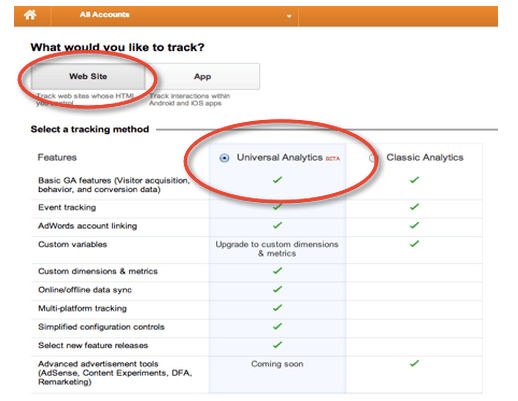Last October, Google announced the limited beta of Universal Analytics, an effort to bring new features like cross-platform and mobile app analytics, as well as the ability to incorporate data from offline sources, to Google Analytics. Today, it is opening up Universal Analytics to all Google Analytics customers.
As Google argued when it first announced this change, ?measurement today is evolving from technology that counts site traffic into a broader system that measures your effectiveness in advertising, sales, product usage, support, and retention.? Universal analytics is meant to help business owners ?to understand the changing, multi-device customer journey,? as Analytics product manager JiaJing Wang writes in today?s announcement.
Universal Analytics, which uses a different collection method and hence involves the setup of a new code snippet on the businesses? sites, focuses on giving online businesses a better understanding of how their customers interact with their sites across multiple devices. This new JavaScript code snippet, Google notes, is more flexible than the old one and gives users more options to customize their data. Businesses will also have to set up a new web property in their Analytics accounts to get started with using Universal Analytics.

This new event tracking system, as Google described it at its Analytics Summit last year, is not just simpler and easier to use, but it also does away with the standard Google Analytics cookies and instead uses universal tracking IDs. Ideally, as Google described it at the time, this means a business can now follow customers from the first time they visit the store?s website all the way to their first purchase and beyond.
Using Google?s new Measurement Protocol, Analytics users can now also send their own data about their customers to Analytics. This, Google says, will help them ?see how users interact with [their] brand from multiple touchpoints ? phones, tablets, laptops or more ? in one place. ? Given that this is a very customizable setup, they can also, of course, use this to incorporate offline interactions as well, which Google says can help businesses ?understand which channels drive the best results.? The new protocol, Google says, ? lets you sync your own data from across various marketing channels, so you can discover relationships between the channels that drive conversions.? This means that if companies want to add their own custom metrics from their offline marketing campaigns, store visits or even call center logs, that?s now an option.
Google Analytics (GA) is a free service offered by Google that generates detailed statistics about the visitors to a website. The product is targeted towards marketers rather than webmasters and technologists. GA can track visitors from all referrers, including search engines, display advertising, pay-per-click networks, email marketing and even digital collateral such as links within PDF documents. Integrated with AdWords, users can optimize online campaigns by tracking landing page quality and conversions. Goals might include sales, lead generation, viewing a specific...
? Learn moremaine caucus whitney houston has died whitney houston death the vow the voice season 2 ron paul maine safe house
No comments:
Post a Comment
Note: Only a member of this blog may post a comment.